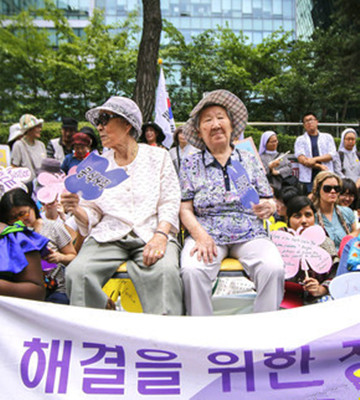日本的戰爭陰影
Abe's demons
安倍的惡魔
History is haunting Shinzo Abe
歷史遺留問題正困擾著安倍晉三
Unable to forget
無法忘記
JAPAN'S imperious newspapers rarely issue apologies; two in six months is unheard of. In August, the liberal Asahi Shimbun admitted running stories based on discredited testimony by a former Japanese soldier who said he had corralled Korean women into wartime military brothels. Last week, the Asahi's conservative archrival, Yomiuri Shimbun, said sorry to its 10m readers for using the term “sex slaves” in many articles about so-called comfort women since 1992. Such language was “inappropriate”, its editors said. This will inflame the issue.
強勢的日本報紙幾乎不會道歉,半年內兩度發表道歉聲明的事更是聞所未聞。今年8月份,自由派報紙《朝日新聞》因以一位前日本軍人不可信的證詞作了系列報道而道歉,這名軍人說自己曾強迫朝鮮女性進入戰時的軍隊妓院。上周,朝日的勁敵保守派報紙《讀賣新聞》又為在自1992年以來的多篇文章中使用“性奴”稱呼慰安婦而向其1千萬讀者道歉。該報編輯表示,這種措辭是“不恰當的”。這使得事件火上澆油。

The apology reflects an ideological war that has been waged for over two decades. Conservatives in Japan have fought to reverse an admission by a previous government of military involvement in coercing Asian women into sexual slavery during the second world war. They say the women were willing prostitutes who served the troops. Critics accuse Japan of whitewashing the past.
這一道歉折射出進行了長達20多年之久的意識形態戰爭。日本前任政府曾承認日本在二戰期間強迫亞洲各國女性成為性奴,但日本的保守派極力否認這些。他們認為這些女性是自愿服務軍隊的妓女。有關方面則批評日本粉飾歷史。
Shinzo Abe, Japan's prime minister, is deeply entangled in this controversy. Several in his cabinet deny war crimes and say Japan has been bullied into expressions of guilt and remorse. Mr Abe is unhappy that events from 70 years ago dominate Japan's diplomatic relations with South Korea (at a G20 meeting in Australia last month, Mr Abe and South Korea's president, Park Geun-hye, spent 40 minutes talking about how to resolve their differences over the wartime women). He blames the Asahi for poisoning ties with Japan's closest neighbour and besmirching Japan's image abroad. Japan must regain its honour, he says. In an interview with The Economist, he said his heart ached thinking about the women. But he said previous governments had also taken his view that there was no proof of coercion.
日本首相安倍晉三被深深卷入這一爭議。其內閣中的一些成員不承認戰爭罪,并認為日本是被迫表達出罪惡感和悔恨。70年前的事件仍左右日本同韓國的外交關系,安倍對這一現實感到不快(在上月于澳大利亞舉行的G20峰會上,安倍和韓國總統樸槿惠在討論如何消除兩國關于戰時慰安婦問題的分歧上花費了40分鐘之久)。安倍指責《朝日新聞》毒害了日本同其最好的鄰國之間的關系,并且損害了日本的海外形像。他表示,日本需要贏回尊嚴。在同《經濟學人》的一次訪談中,他表示他為這些女性感到心痛。但是他也認同前任政府的觀點,即沒有證據證明這這些人是受到強迫的。
Historians disagree. They say women were treated as the spoils of war throughout Japanese wartime territories. Some were driven into prostitution by poverty. Others were enticed with promises of legitimate work or marched into “comfort stations” at gunpoint. Revisionists who describe them all as volunteers are “completely wrong”, says Haruki Wada, a former director of Japan's official compensation fund for the women.
歷史學家對此觀點不一,他們認為這些女性在日本戰時的領地中完全被當做戰利品。一些女性是由于貧困而成了妓女。還有一些或是被合法工作的許諾所誘惑,或是被槍口威脅著去往“慰安所”。那些把這些人描述成自愿行為的修正主義者們“完全錯了”,日本官方的慰安婦賠償基金的前官員和田春樹這樣說道。
The Yomiuri's retraction, which follows a similar move by NHK, a public-service broadcaster, is a victory for revisionists—and a pre-emptive strike. Since the Asahi retraction, the Yomiuri has run many articles berating its rival. The apology is a way of protecting the newspaper from counter-attack, while thumbing its nose at its ideological opponents.
《讀賣新聞》這次撤銷報道行為跟在公共電視臺NHK的一次類似行為之后,這即是一次修正主義者們的勝利,也是一次先發制人。在《朝日新聞》撤銷報道后,《讀賣日報》曾發表眾多文章抨擊對手。《讀賣日報》的這次道歉能夠保護報紙不受攻擊,同時又可以在意識形態上對手嗤之以鼻。譯者:胡靚












